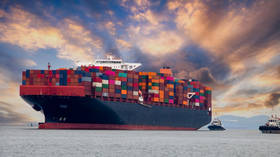Ocean freight rates skyrocketing – WSJ

The average cost of a container has more than doubled globally in the past month, according to an article in the Wall Street Journal published on Sunday.
The disruptions caused by the continued Houthi attacks on cargo vessels in the Red Sea are sending shockwaves across global supply chains, delaying shipments and raising transportation costs, the article states.
The data cited by the outlet, which is from London-based Drewry Shipping Consultants, shows that the average worldwide cost of shipping a 40-foot container jumped 23% to $3,777 just in the week ending January 18. That puts the current rate at more than double what was being charged a month ago.
“The increases are being felt far beyond the disrupted trade routes that link China with Europe and the US East Coast,” the WSJ wrote, noting that spot rates to ship a container from China to Los Angeles had soared by 38% in the week through January 18, to $3,860.
“Volatility is back, big time in international container shipping,” Philip Damas, managing director of Drewry, said, as quoted by the WSJ.
Damas explained that many big companies that have longer-term contracts with ocean carriers are paying surcharges of 20% or more on top of contract rates to compensate for higher costs, such as on fuel and insurance.
The Yemen-based Houthi rebels have carried out dozens of drone and missile attacks in the Red Sea since the beginning of the Israel-Hamas conflict in October. The militant group has vowed to continue until the hostilities end and the Israeli blockade of Gaza is lifted.
The increased risk of attack in the Red Sea has forced major shipping firms to avoid the Suez Canal, which is the fastest route for moving cargo between Asia and Europe. Maritime traffic through the vital route, which normally accounts for 15% of global commercial shipping, is down 37% so far in 2024 from a year ago, according to figures from the IMF.
For more stories on economy & finance visit RT's business section












